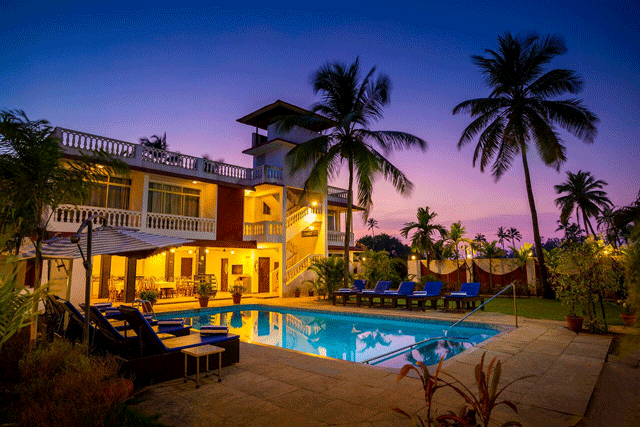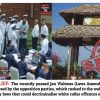Goa is abuzz with excitement as vintage bike and car owners, users, collectors and fans are decking […]

RE-ZONING OF GOAN BEACHES TO FAVOUR BUILDERS!
In the News, July 17- July 23, 2021 July 16, 2021CONDONED: Though former local MLA and chief minister, Laxmikant Parsekar, has admitted that the dozens of hotels on Morjim beach are illegal, he claims he did not taken any action as they provide employment to locals
By Mayura Janwalkar
The new draft Coastal Zone Management Plan seeks to ecologically include sensitive areas into the development zone for the benefit of builders. The locals are furious that the interest of fisher-folk and shacks and others who are dependent on the beaches have been ignored by the draft CZMP.
In Goa, which has a 105 km coastline, discontent has been brewing over a number of issues, including the duration to respond to the draft, re-zoning of beach areas and accommodating allegedly illegal constructions.
The draft Coastal Zone Management Plan (CZMP) prepared by the National Centre for Sustainable Coastal Management (NCSCM), Chennai – an agency approved by the Centre – has stoked a controversy in Goa after the draft met with criticism from locals, environmentalists and political parties.
In India’s smallest state with a 105 km coastline, discontent has been brewing over a number of issues, including the duration to respond to the draft, re-zoning of beach areas and accommodating allegedly illegal constructions.
What is the CZMP?
The Union Ministry of Environment, Forests and Climate Change (MoEF), in a notification of January 6, 2011, stated that it wanted to secure the livelihood of the fishing communities and other local communities living in the coastal areas, conserve and protect coastal stretches, their unique environment and marine area and promote development in a sustainable manner.
The CRZ notification 2011 declared that the coastal stretches of the country and India’s territorial waters, excluding Andaman and Nicobar and Lakshadweep islands, as Coastal Regulation Zone (CRZ) and restricted the setting up and expansion of any industry, operations or processes and manufacture or handling or storage or disposal of hazardous substances there.
The respective state governments and Union Territories were then directed to prepare Coastal Zone Management Plans (CZMP) by identifying and classifying the CRZ areas.
The Goa state department of environment handed over the responsibility of preparing the CZMP to the NCSCM in 2014.
The NCSCM’s draft report made public earlier this year states that the primary purpose of a CZMP is to describe proposed actions to be implemented by administrative or other public authorities and potentially by the private sector to address priority management issues in the coastal zone over a defined implementation period.
Why are some groups upset over the draft CZMP?
Environmentalists, local bodies and opposition parties have all voiced their opposition to the draft CZMP report. Environmentalist and Goa Foundation director Claude Alvares said in a statement issued earlier this week that they had informed the Goa Coastal Zone Management Authority (GCZMA) constituted by the MoEF, that the 30-day limit for suggestions and objections to the draft was not legal, as it was contrary to the 60-day limit provided by the Environment Protection Rules, 1986.
He said that people have the right to file detailed written objections before March 30, 2021 irrespective of the public hearing scheduled by the collector next week.
Goa Foundation alleged that several errors have been allowed into the draft CZMPs. “Re-zoning of beach areas like Querim (Tiracol), Palolem, Cola have been carried out without any legal basis. Each village community is finding hundreds of errors in the village plans,” said Alvares. He said that the GCZMA had put up the maps for public hearing without examining them first as a result of which errors pointed out by village communities during the 2019 public consultation have remained in the new draft plans. “Changes made to show several illegal constructions in the draft CZMPs (when several legitimate constructions have been left out) indicate indirect influence on the preparation of the draft CZMPs. This may require a criminal investigation” said Alvares.
Activists had alleged that 254 maps that were to cover the state but certain villages and municipal areas have been missing from the maps.
Locals and fishermen from South Goa villages have claimed that structures including some homes and churches have been left out of the CZMP. Traditional Fishermen Association and Goenchea Raponkarancho Ekvott had approached the Bombay High Court urging it to quash and set aside the public hearings scheduled on March 7. Earlier this week, however, the Goa bench of the High Court asked the petitioners to move the National Green Tribunal and disposed of the petitions.
Why is the opposition targeting the BJP government in Goa over the issue?
Last year, legislators across party lines had initially criticised the CZMP for its alleged errors and omissions. However, with the public hearing set to be held on March 7, opposition parties trained guns on the BJP government accusing it of holding public hearings only to put on a show of following procedures before the draft CZMP is finalised.
On Friday, the AAP condemned the one-day hearing on the CZMP and said the so-called hearing “is nothing but a farce only to meet the legal provisions and nothing else”.
AAP leader Surel Tilve questioned the state government’s intention in fixing only one day to decide the plan for the entire coastline of Goa
He said the government is only seeking to restrict the number of speakers on the CZMP and hence trying to suppress the voice of the people. “Various gram sabhas have already rejected the CZMP and the haste in which the government is conducting the hearing is nothing but suppressing the voice of the people,” he said.
Independent MLA Rohan Khaunte had earlier said that CZMP hearings “are absolutely flawed with purposeful withholding of mapped information. It appears to be a ploy to facilitate certain vested interests in particular areas.” He said in a tweet that the Pramod Sawant-led government was against Goa’s environmental interests.
What happens next?
The public hearing on the finalisation of the draft CZMP will be held on Sunday from 10:30 am to 5 pm in Panaji for North Goa and in Margao for South Goa. Following Covid-19 safety protocols, the GCZMA has been asked to limit the number of participants to 50 per cent of the venue capacity. Each speaker will be given no more than five minutes to speak and only 150 speakers will be registered. Those who are unable to attend the hearing can submit their written representations to the GCZMA or the district collector by March 15. Modes of virtual hearing will also be kept open on March 7, an order issued by the North Goa and South Goa Collectors on Wednesday stated.
Coutersy:www.indianexpress.com















